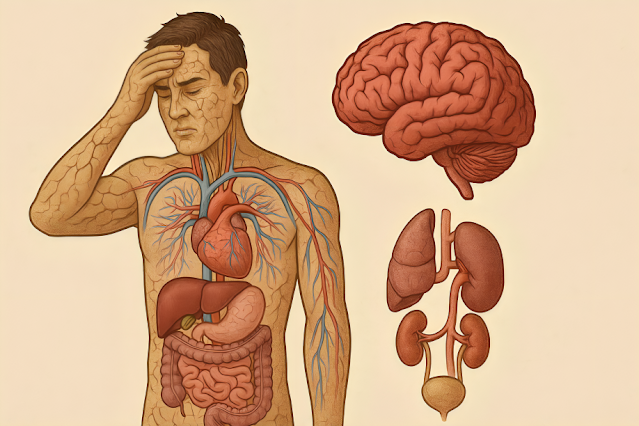How to prevent dehydration
Dehydration: Causes, Symptoms, Prevention & Remedies for a Healthier You
Understanding Dehydration: A Silent Threat to Your Well-Being
Dehydration is thirst with many unpleasant consequences,it's a critical state that occurs when your body sheds more water than it takes in. Water is essential for nearly every process of the human body, ranging from temperature control to toxic waste elimination. When hydration levels fall, even slightly, it will have a noticeable impact on your physical and mental performance.
Although often overlooked, dehydration can become dangerous if ignored, especially in vulnerable individuals like children, elderly persons, and sports players. Knowing its causes, signs, and remedies can assist you in becoming healthier day by day.
Why Does Dehydration Happen?
Dehydration results from numerous potential causes. Some are known to you, while others may surprise you:
Inadequate Water Intake: Not drinking enough water during the day is the most common cause.
Heavy Sweating: Sweating heavily as a result of exercise or exposure to hot weather without compensating for lost fluids leads to dehydration.
Diseases: Fever, vomiting, or diarrhoea diseases lead to fluid loss suddenly.
Increased Urination: Some drugs, alcohol, or diseases like diabetes lead to excessive urination, causing an imbalance of fluids.
Burns and Skin Injuries: Dehydrated skin loses moisture quickly, leading to dehydration.
Recognizing the Warning Signs: Warning Signs of Dehydration
Symptoms of dehydration can range from mild to severe depending on the amount of fluid lost. The following are the primary signs to look out for:
Mild to Moderate Dehydration:
- Dryness of mouth and throat
- Thirst
- Headache
- Tiredness or fatigue
- Light-headedness or dizziness
- Dark yellow urine
- Cool, dry skin
- Reduced urine output
Severe Dehydration:
- Racing heartbeat
- Rapid breathing
- Sunken eyes
- Irritability or confusion
- No sweating even in heat
- Fainting or unconsciousness
- Little or no urination
Important Note: Severe dehydration is a medical emergency. Get prompt medical attention if these signs are observed.
Who's Most at Risk?
Certain individuals are more prone to dehydration and must take extra care:
Infants and small children: They lose water more quickly and may not always be able to tell when they are thirsty.
Older adults: The body with age loses its sense of thirst.
Athletes: Strenuous exercise results in increased loss of fluid from sweat.
Chronic disease patients: Conditions like diabetes, kidney disease, and heart disease may increase the risk of dehydration.
How Your Body Reacts to Dehydration
Not drinking enough water doesn't just make you feel weird—it impacts your entire body:
Brain Function: Even mild dehydration can impair mood, concentration, and memory.
Kidneys: Water rinses toxins out of the kidneys. Kidney stones and urinary tract infections result from dehydration.
Digestive Health: Water assists digestion. Dehydration causes constipation and bloating.
Cardiovascular System: Lower fluid volume causes your heart to pump harder, leading to fatigue and low blood pressure.
Joint and Muscle Function: Dehydrated muscles are at greater risk of cramping and injury.
Simple Yet Effective Ways to Prevent Dehydration
Remaining hydrated doesn't need to be a drastic lifestyle change—small consistent practices can do wonders.
1. Drink Lots of Water Every Day
Try for a minimum of 8–10 glasses (2–2.5 litres) of water a day. This can be adjusted based on your level of activity and environment.
2. Begin Your Day with Water
Having a glass of water upon waking up serves to get your body's hydration going after several hours of rest.
3. Consume Water-Rich Foods
Fruits like watermelon, cucumber, strawberries, and oranges have a high water content that contributes to your hydration.
4. Monitor Your Urine Colour
Pale yellow colour indicates you are hydrated, and dark urine indicates you need to drink more water.
5. Drink Before, During & After Exercise
Active people should increase fluid intake to replenish lost sweat, especially during warm and humid conditions.
6. Reduce Caffeine and Alcohol
Both caffeine and alcohol are diuretics, meaning they increase fluid loss. Balance them with water intake.
Remedies for Dehydration: What to Do If You’re Dehydrated
Mild dehydration can be corrected quickly with the following measures:
1.Rehydrate with Water: Sip small amounts frequently rather than gulping all at once.
2.Electrolyte Solutions: Rehydration salts or electrolyte drinks help replace lost sodium, potassium, and other minerals.
3.Coconut Water: A natural electrolyte-rich drink with minimal sugar and additives.
4.Avoid Sugary or Fizzy Drinks: These can worsen dehydration in some cases.
5.Rest in a Cool Area: Reduce physical activity and get out of the heat if applicable.
In cases of moderate to severe dehydration, especially with vomiting or diarrhoea, oral rehydration therapy (ORS) or intravenous fluids may be needed under medical supervision.
Myths About Dehydration Debunked
🤔 “If you’re not thirsty, you’re hydrated.”
Thirst is not always a reliable indicator, especially in the elderly.
🤔 "Hot weather alone causes dehydration."
Cold weather also leads to dehydration through the loss of fluids due to breathing and decreased perception of thirst.
🤔 “But coffee and tea do make a large contribution to hydration.”
They do have some contribution to hydration. But excessive caffeine can cause too much fluid loss, so be moderate.
Final Thoughts: Hydration is a Daily Imperative
Dehydration is preventable, but it's one of the things that falls by the wayside in our busy lives. By paying attention to the early signs and making healthy hydration habits, you can significantly improve your overall health, energy, and mental performance. Drink as a habit, not just when you feel thirsty.
Stay awake, stay hydrated—and your body will thank you.
Have a nice day.😊








Comments
Post a Comment